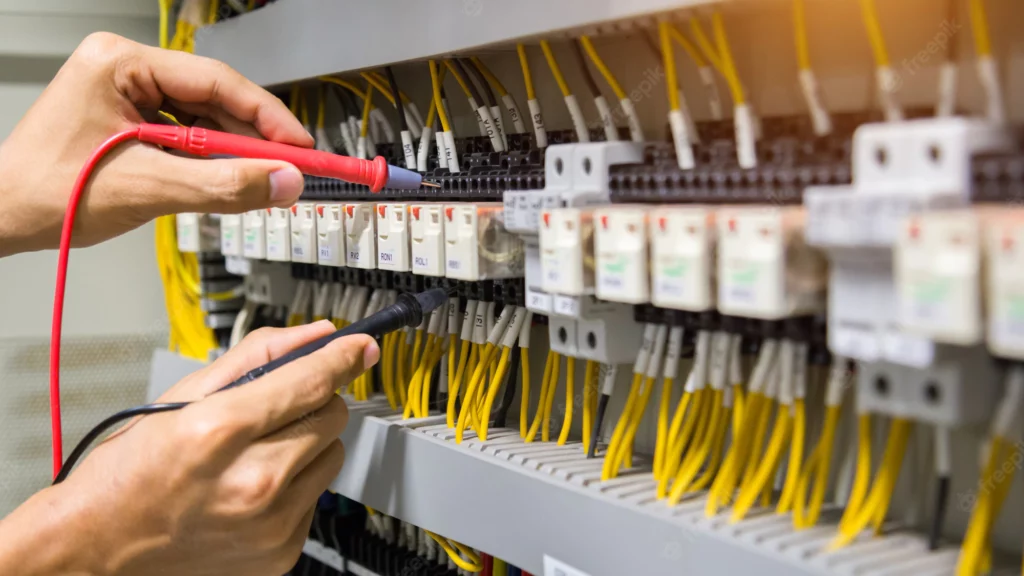How to Start an Electrical Business in 10 Steps

Do you want to start your own electrical contractor business? With electrical contractors earning an average annual salary of $81,000, no wonder that electrical businesses can be very profitable businesses.
In 2021 there were over 70,000 electrical contracting firms in the US employing about 650,000 electrical workers. As per the National Electrical Contractors Association (NECA) the industry is worth $202 billion: that’s an average annual turnover of $2,800,000 per company..!
So if you want to start your own electrical contractor business, you must have a solid business plan and execution. This post will give all the necessary information for you to start and successfully run your electrical business. Let’s dive in!
This post will give all the necessary information for you to start and successfully run your electrical business. Let’s dive in!
For more information on electrical contractors, make sure to read our guide below: How to Write a Business Plan for a Electrical Contractor
1. Conduct Research
The first and most logical step is to conduct research and study your competitors. You must understand whether there is enough demand in the market to accommodate a new electrical business.
Here are certain things that you must strive to answer in your research:
- How many competitors are there in the market?
- What is the service area of the competitors?
- What type of services do the competitors offer and is there a demand for other services?
- Who are the customers of the competitors (businesses or individuals)?
- What is the marketing strategy they use?
- What are the cost estimates for starting an electrical business?
Your research will reveal whether the business is viable or not.

2. Carefully Select Services
There are two broad categories – Linemen (outdoor electricians) and Wiremen (indoor electricians).
Linemen usually deal with higher voltages and electrical transmission systems responsible for moving electricity to customers from substations.
Wiremen work on interior wiring systems and their work can involve installation, maintenance, and repair of things like alarm systems, fans, gate systems, etc. Both businesses and individuals can be the clients of wiremen.
You may also offer certain specialisations such as:
- Auto electricians
- Electrical inspection
- Fire and security alarm installation
- Industrial electricians
- Installing smart solutions
- Maintenance electricians
- Outdoor lighting
- Telecommunication line installation & repair
- Wind turbine electricians

3. Pen a Solid Business Plan
Once you have the research data and the concept, it is time to focus on creating a robust business plan. If you are eyeing some investment, this document is vital. The plan should clearly define your vision along with your financial plan.
You can break your business plan into multiple segments that will include:
- Executive summary: This is where you will define your company’s identity. Logically explain the services you will provide and why. You must define your future goals, too
- Company overview: Answer why you want to start this business. Also, define the type of services you will offer, to whom / which companies and their respective prices
- Market overview: how big is the electrical contractor industry in your area? How many competitors are there? How do you differentiate vs. competition?
- Management & people: Describe the organizational structure of your company. Define the key roles, reporting lines and responsibilities.
- Financial plan: how much profit and revenue do you expect in the next 5 years? When will you reach the break-even point and start making profits? You can include here a chart with your key financials (revenue, gross profit, net profit)
- Funding ask: what loan/investment/grant are you seeking? How much do you need? How long will this last?
Appendix: This section will contain all the extra information that you didn’t include earlier. For example, you can add your logo, any contracts you might have with suppliers and / or your office lease space, etc.
4. Get Funding
Starting an electrical business can be expensive and it can cost anywhere between $5,000 and $25,000 just to set up your business, purchase necessary equipment, and advertise.
Unfortunately, these costs do not include apprenticeships or schooling costs that can cost between $3,000 and $20,000, and sometimes more.
If you intend to run a mobile business, you will need a van that can cost upwards of $60,000. You can consider renting a van or truck or purchasing a used one to reduce expenses. There will be additional operating costs.
Even if you don’t want to run a mobile business, you will still need a vehicle or two depending on the scale of your operation to visit the sites and carry your equipment. In such scenarios, you can operate using pickup trucks.
Thus, you may need external funding. Some of the various sources of funding include:
- Bank loans (including Small Business Administration loans)
- Equipment financing
- Rollover of Business Startup (ROBS) using a retirement account
- Private investors
Remember that the funding you receive must cover all expenses including your equipment, licenses & permits, office rent & setup, van(s) that you will use, etc.

5. Acquire Permits & Licenses
Before you start your electrical business, you will need to acquire the relevant permits and licenses to do business.
Most states in America will require you to pass an exam and acquire a license. You can check the examination & licensing requirements of your state from the website of the National Electrical Contractors Association.
Plus, there may be local regulatory and licensing requirements. You must check with the clerk’s office of your county, city, or state. If you find it difficult to get the necessary information, you can seek assistance from local associations listed in the SBA directory of local business resources.
Most likely, you will need to collect sales tax on the services you offer. You will need a seller’s permit, which is often known as a Sales Tax Certificate of Authority or a Sales Tax Permit. Every state issue this.
You can visit the Department of Revenue homepage of your state to register for a seller’s permit. Remember to keep the paperwork for your business formation (you must register your business before acquiring permits & licenses) and your EIN or Employee Identification Number.
Most states will give you a seller’s permit for free, but some states may ask for a small registration fee.
6. Buy Tools & Equipment
To run an electrical business efficiently, you must have the proper equipment, tools, and supplies.
If you’re new and don’t have any starting equipment (from past jobs or your own tools), the costs to buy tools and equipment will likely represent a big chunk of your startup costs.
Here is a quick list of the essential items that you must have:
- Electric drill
- Flux cleaner
- Kapton tape
- Single and multi-core wires
- Pliers
- Screwdrivers
- Solder flux, wick, wire
- Voltage tester
- Wire cutters and wrapping wire
Overall, you can expect to spend around $6,000 to $10,000 in tools and initial stock acquisition.

7. Get a Business Insurance
You will need business insurance to ensure that you operate lawfully and safely. Business insurance can protect your company’s financial health in the event of a loss. However, such loss must be covered by the insurance policy.
In general, you must consider getting General Liability Insurance and Workers’ Compensation Insurance. You can also add Professional Liability Insurance, Commercial Property Insurance, Commercial Automobile Insurance, and Equipment Insurance.
8. Create an Online Presence
Today, every business has an online presence, and you must have one, too! It helps people to find your business, allows you to easily create a local listing on search engines, can also list your website on online directories, etc.
A website can list all your services and their corresponding prices. This will help your potential clients to understand whether you are the right choice for their needs and budget.
Once you have your website, you can perform local SEO to get noticed in online searches.
9. Hire Staff
The next logical step is to hire staff. You may hire office workers, journeymen, apprentices, etc. depending on your needs. However, don’t get into a hiring spree. Hire only those who you need. For instance, you may need only one office worker to handle client calls, maintain records, liaise with the accountant and payroll 3rd parties, etc.
Thus, assess your needs properly before you start hiring, and make sure that you are paying your staff properly. As a reference point, the hourly rate for electricians in 2021 was $28.87 according to the US Bureau of Labor Statistics.

10. Advertise Your Business
Like it or not, you will need to spend money on advertising your business and get noticed. The advertisement channel or channels you select will depend on your marketing strategy.
In general, if you have an office (not a mobile business), you must use clear signage. For the mobile business, you will need vehicle wraps to get noticed. You can use pamphlets and flyers, local print ads, radio and TV ads, etc.
Of course, word of mouth is one of the best advertisement channels ever, but for that, you must have a few clients who can recommend you.
Effective and intelligent advertisements can help your business to grow quickly.

